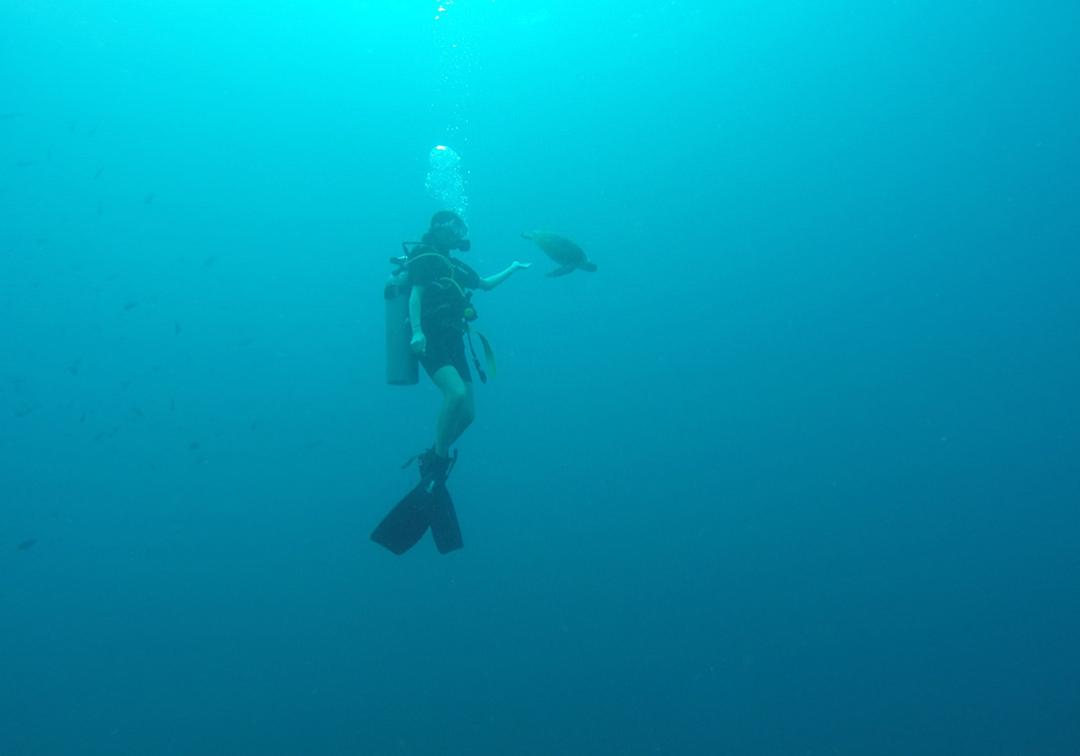
Bachelors of Computer Science / Science
Overview
Combine your love of science with computer science and graduate with 2 qualifications that prepare you for a technology-driven world.
In this 4-year dual degree, you'll gain in-demand skills to tackle global challenges across industries—from bioinformatics to digital humanities.
Master the theory and practice of computer science, specialising in areas like cyber security, data science, machine learning, programming languages, or scientific computing.
Customise your science studies with a broad range of majors, building interdisciplinary knowledge and practical skills to match your interests.
Graduate with sought-after expertise, strong analytical abilities, and the technical skills to excel in a fast-evolving job market.
Program highlights
- Gain hands-on experience through lab-based practicals, workshops, field studies, internships and industry placements in Australia or abroad.
- Study a program designed in collaboration with industry leaders to ensure you're ready for the real world.
- Choose from one of the widest selections of science disciplines in Australia to tailor your studies to your passion.
- Graduate with high-demand skills sought after by global tech giants like Apple, Google, Oracle and Microsoft.
Majors
Tailor your studies to suit your goals. This program offers these options:
- Applied Mathematics
- Archaeological Science
- Biochemistry and Molecular Biology
- Bioinformatics
How you'll learn
Your learning experiences are designed to best suit the learning outcomes of the courses you choose.
- Lectures
- Tutorials
- Laboratory work
- Fieldwork
- Workshops
What you'll study
At UQ, degrees are called 'programs' and subjects are called 'courses'.
Career possibilities
Our programs prepare you for your first job and beyond. Depending on which major you choose, here are some of the careers you could be on your way to:
- Biosecurity officer
- Data scientist
- Historical archaeology consultant
- Environmental health officer
- Biopharmaceutical scientist
- Senior project chemist
- Environmental adviser
- Biomedical scientist
- Gene technologies scientist
Average annual salary range
Data Scientist
seek.com.au
Average annual salary range
Biosecurity Officer
seek.com.au
Professional memberships
When you graduate, you may be eligible for memberships with the following professional organisations. Contact the organisation to find out how to become a member.
- Australian Computer Society
Program accreditation
The Bachelors of Computer Science / Science is accredited by:
- Australian Computer Society
Events
See all events
9 June
Master of Physiotherapy information webinar
Stories
See all stories
Uni life
What's it really like to study computer science at UQ?
7-minute read

Uni life
What's it really like to study science at UQ?
9-minute read
Stories
See all stories
Uni life
What's it really like to study computer science at UQ?
7-minute read

Uni life
What's it really like to study science at UQ?
9-minute read

Careers
What jobs can you do with a Bachelor of Science?
7-minute read
Entry requirements
Prerequisites
- General English subject (Units 3 & 4, C);
- Mathematical Methods (Units 3 & 4, C);
- and one of Biology, Chemistry, Earth and Environmental Science, or Physics (Units 3 & 4, C).
- From Semester 1, 2028, Earth and Environmental Science will no longer be accepted.
Prerequisites
- General English subject (Units 3 & 4, C);
- Mathematical Methods (Units 3 & 4, C);
- and one of Biology, Chemistry, Earth and Environmental Science, or Physics (Units 3 & 4, C).
- From Semester 1, 2028, Earth and Environmental Science will no longer be accepted.
Entry score threshold
| ATAR / Rank | IB |
|---|---|
| 84 | 32 |
These are the lowest adjusted scores we made an offer to in Semester 1, 2026. Entry scores are based on the most recent Semester 1 intake and are updated in April each year. Meeting the entry score threshold doesn't guarantee admission.
Guarantee your place at UQ: If you meet our guaranteed minimum ATAR you could secure an offer for your preferred program.
English language requirements
IELTS overall 6.5; reading 6; writing 6; speaking 6; listening 6. For other English Language Proficiency Tests and Scores approved for UQ
TOEFL iBT (including Paper Edition) - Overall 87, listening 19, reading 19, writing 21 and speaking 19.
PTE Academic - Overall Score of 64 and 60 in all sub bands.
BE - A minimum overall grade of 4 plus a minimum grade of C in all macro skills.
CES - Overall 176 and 169 in all sub bands.
OET is not accepted.
There are other ways to meet the English language requirements. For some programs, additional conditions apply.
Student visas
International students who are accepted into full-time study in the Bachelors of Computer Science / Science are eligible to apply for an Australian student visa (subclass 500).
There are a number of requirements you must satisfy before a visa is granted, including the Genuine Student (GS) requirement.
Entry score range
This table shows the range of entry scores for recent secondary students offered a place in the B Computer Science/BScience for Semester 1, 2026
| Without adjustments | With adjustments | |
|---|---|---|
| Highest | 99.85 | 99.95 |
| Median | 93.05 | 93.7 |
| Lowest | 84.95 | 86.95 |
Who you'll study with
Here's a snapshot of our student intake for this program in Semester 1, 2026:
| Applicant background | Number of students | Percentage of all students |
|---|---|---|
(A) Higher education study | <5 | <5 |
(B) Vocational Education and Training (VET) study | 0 | 0% |
(C) Work and life experience | 0 | 0% |
| (D) Recent secondary education | ||
| N/P | N/P |
| 0 | 0% |
| 0 | 0% |
International students | 0 | 0% |
Total | 12 | 100% |
"<5" — The number of students is less than 5.
N/A — Students not accepted in this category.
N/P — Not published. The number is hidden to protect the privacy of students in other cells.
Need help meeting the entry requirements?
Additional application information
Additional application information
Majors
Majors
Tailor your studies to suit your goals. This program offers these options:
Majors
Tailor your studies to suit your goals. This program offers these options:
Fees and Scholarships
Indicative annual fee
Approximate yearly cost of tuition (16 units). Your fees will vary according to your selected courses and study load. Fees are reviewed each year and may increase.
$8,215
2026
Approximate yearly cost of tuition (16 units). Your fees will vary according to your study load. Fees are reviewed each year and may increase.
AUD $58,056
2026
Government assistance
Financial aid
As an international student, you might be eligible for financial aid – either from your home country, or from the Australian Government.
HECS-HELP
Domestic places in the Bachelors of Computer Science / Science are Commonwealth supported, as long as you meet all Commonwealth supported place eligibility requirements.
This means the cost of your education is shared between you and the Australian Government. Instead of tuition fees, Commonwealth supported students pay what are called student contribution amounts.
If you have a Commonwealth supported place, you may also be eligible for HECS-HELP. This is an Australian Government loan scheme to assist eligible students with the cost of their student contribution amounts.
Centrelink support
The Australian Government offers a number of income-support payments to eligible Australian university students.
Scholarships
You may be eligible for more than 100 scholarships, including:
How to apply
Applying online
If your senior schooling is from outside Australia, you can submit your application to UQ. Or, if you prefer, you can use an approved UQ agent near you.
The program code for the Bachelors of Computer Science / Science is 2566.
How to apply for undergraduate study
If your senior schooling is from Australia
Submit your application to the Queensland Tertiary Admissions Centre if you're an international student who is currently studying:
- Australian Year 12 (in Australia or another country), or
- the International Baccalaureate in Australia.
The QTAC code for the Bachelors of Computer Science / Science is 733601.
Applying through QTAC
All domestic applications should be submitted to the Queensland Tertiary Admissions Centre (QTAC).
The QTAC code for the Bachelors of Computer Science / Science is 733601.
Important dates
If you’re studying Year 12 in Australia, go to the QTAC website to check the closing date for this program.
If you’re applying to UQ, the closing date for this program is:
- To commence study in semester 2 - May 31 of the year of commencement.
- To commence study in semester 1 - November 30 of the previous year.
Visa processing times vary. Apply and accept your offer as early as you can.
To learn more about UQ dates, including semester start dates, view the Academic Calendar.
Important dates
To check the closing date for this program, go to the QTAC website.
To learn more about UQ dates, including semester start dates, view the Academic Calendar.
Admissions schemes
Applying to university can be both exciting and daunting, which is why we’ve tried to make the process as simple as we can.
We have several schemes in place to improve your chances of getting a place at UQ.
Pathway options
A rank or score doesn’t determine your potential.
If you're not offered a place in your first-choice program – or if you don't meet the entry requirements – you still have a number of options.
Aboriginal and Torres Strait Islander applicants
For support with applying – or if you have any questions about university life – get in touch with our Aboriginal and Torres Strait Islander Studies (ATSIS) Unit.
Explore other programs
Express yourself. And your interest.
They say choosing a degree is hard, which is why we've made it easy. Register your interest and we'll send you everything you need to know about applying to UQ.






